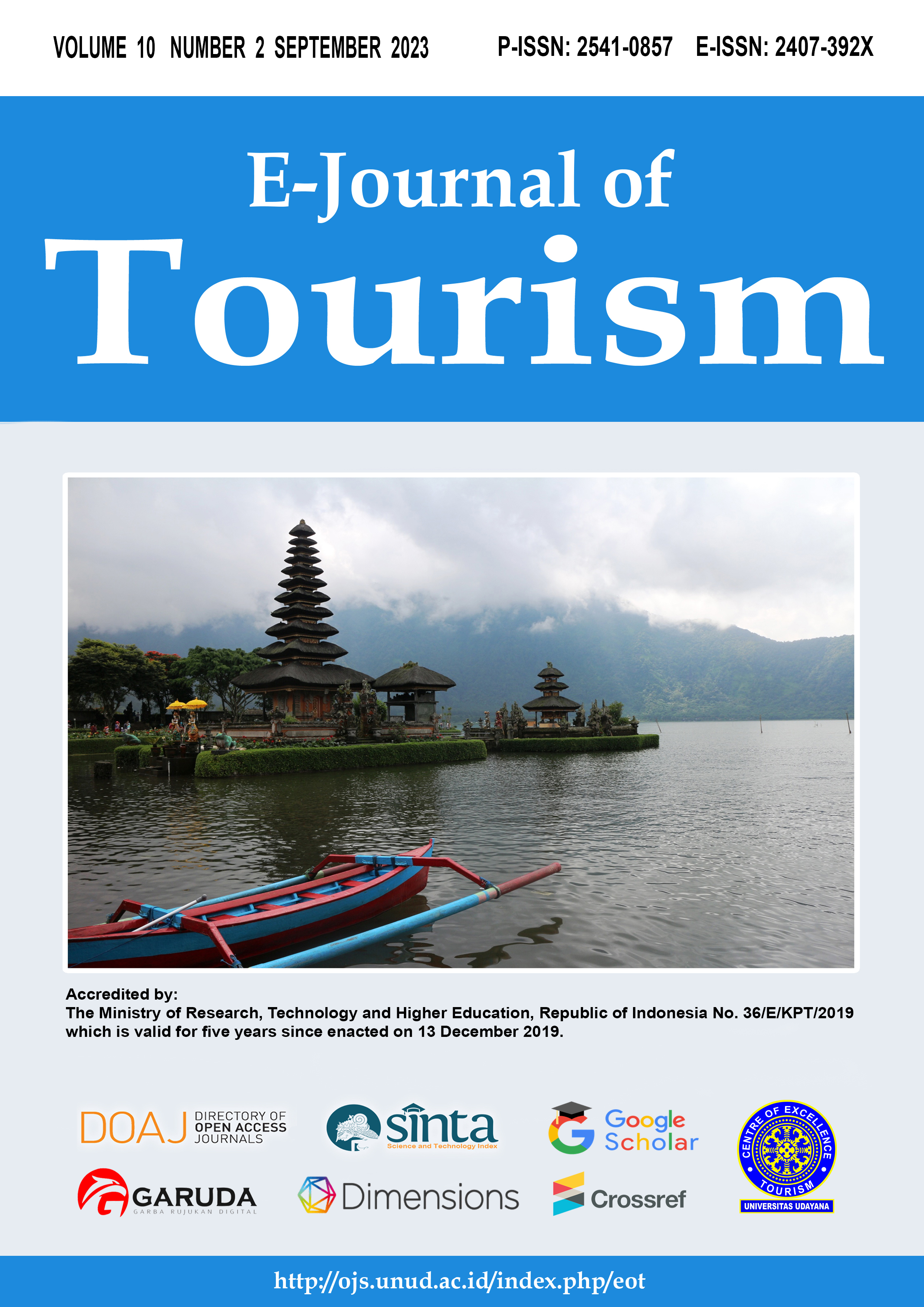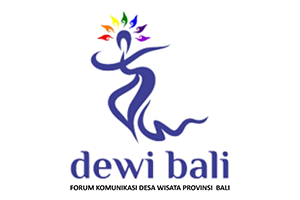Challenges and Strategies: Willingness to Pay for Mangrove Forest Ecotourism Development In Indonesia
Abstract
This study aims to analyze the community's willingness to pay (WTP) and formulate a strategy for developing mangrove forest ecotourism. This study uses a mixed method with a sampling method using accidental sampling of as many as 155 respondents and purposive sampling of as many as seven key people. The results showed that as many as 89% of respondents stated they were willing to spend some money with a total WTP value of US$ 23894.46/year. Most of them have WTP because they believe ecotourism development can increase their income and create them. The total value of WTP can be used as a reference in determining ecotourism entrance tickets. The results of the study suggest strategies that can be done for ecotourism development are to increase supporting facilities, carry out conservation efforts, and increase synergies between stakeholders.
Downloads
References
Ardiansyah, M., Suharno and Susilowati, I. (2019) ‘Estimating the conservation value of mangrove forests in marine protected areas: Special reference to karimunjawa waters, Indonesia’, AACL Bioflux, 12(2), pp. 437–447.
Arifanti, V.B. (2020) ‘Mangrove management and climate change: a review in Indonesia’, in IOP conference series: earth and environmental science. IOP Publishing, p. 12022.
Arifanti, V.B. et al. (2022) ‘Challenges and Strategies for Sustainable Mangrove Management in Indonesia: A Review’, Forests, 13(5), pp. 1–18. Available at: https://doi.org/10.3390/f13050695.
Arkwright, D. and Kaomaneng, I.S. (2018) ‘Mangrove Ecotourism Development on Kakaralamo Island North Halmahera : Community perception , participation and development strategies Mangrove Ecotourism Development on Kakaralamo Island North Halmahera : Community perception , participation and developm’, IOP Conf. Series: Earth and Environmental Science [Preprint].
Ashok, S. et al. (2017) ‘Development of ecotourism sustainability assessment framework employing Delphi, C&I and participatory methods: A case study of KBR, West Sikkim, India’, Tourism Management Perspectives, 21, pp. 24–41. Available at: https://doi.org/10.1016/j.tmp.2016.10.005.
Asian Forest Cooperation Organization (AFoCO) (2022) Overview of Forest Sector, 2022. Available at: https://afocosec.org/knowledge/country-information-hub/indonesia/ (Accessed: 7 August 2022).
Aye, W.N. et al. (2019) ‘Contribution of mangrove forest to the livelihood of local communities in Ayeyarwaddy Region, Myanmar’, Forests, 10(5). Available at: https://doi.org/10.3390/f10050414.
Basyuni, M. et al. (2022) ‘Mangrove Biodiversity, Conservation and Roles for Livelihoods in Indonesia’, in Mangroves: Biodiversity, Livelihoods and Conservation. Springer, pp. 397–445.
Binu, T.M. and Phil, B.E. (2022) ‘Ecotourism: A Sustainable Development Connect to Nature and A Strategy for Balancing Economic Growth, Socio-Cultural Development and Conservation’, Asia Pacific Journal of Advanced Education and Technology, 1(1), pp. 64–72.
BRGM (2021) Peringati Hari Mangrove Sedunia, BRGM perkuat Komitmen Percepatan Rehabilitasi Mangrove Berbasis Masyarakat di Indonesia, BRGM. Available at: https://ppid.brgm.go.id/siaranpers/peringati-hari-mangrove-sedunia-brgm-perkuat-komitmen-percepatan-rehabilitasi-mangrove-berbasis-masyarakat-di-indonesia/ (Accessed: 29 July 2022).
Cahyaningsing, A.P. et al. (2022) ‘Causes and impacts of anthropogenic activities on mangrove deforestation and degradation in Indonesia’, International Journal of Bonorowo Wetlands, 12(1).
Chen, W.Y. and Jim, C.Y. (2010) ‘Resident motivations and willingness-to-pay for urban biodiversity conservation in Guangzhou (China)’, Environmental management, 45(5), pp. 1052–1064.
Diswandi, D. and Saptutyningsih, E. (2019) ‘Using contingent valuation method for estimating the willingness to pay for mangrove forest: A study in West Lombok, Indonesia.’
Doris, A.A. and Wang, R. (2018) ‘Key Determinants of Forest-dependent Guyanese’ Willingness to Contribute to Forest Protection: an application of the Contingent Valuation Method’, International Journal of Scientific and Research Publications (IJSRP), 8(6). Available at: https://doi.org/10.29322/ijsrp.8.6.2018.p7864.
Fattah, M., Utami, T.N. and Intyas, C.A. (2020) ‘Cost-benefit analysis of bee Jay Bakau resort Probolinggo Mangrove ecotourism management’, Ecology, Environment and Conservation, 26, pp. S70–S75.
Ginting, N. and Sasmita, A. (2018) ‘Developing tourism facilities based on geotourism in Silalahi Village, Geopark Toba Caldera’, IOP Conference Series: Earth and Environmental Science, 126(1). Available at: https://doi.org/10.1088/1755-1315/126/1/012163.
Haab, T., Lewis, L. and Whitehead, J. (2020) ‘State of the art of contingent valuation’, Oxford research encyclopedia of environmental science [Preprint].
Hafiz Iqbal, M. and Nur Mozahid, M. (2022) ‘Valuing conservation of the Sundarbans mangrove forest ecosystem’, Trees, Forests and People, 9(April), p. 100278. Available at: https://doi.org/10.1016/j.tfp.2022.100278.
Hakim, L., Siswanto, D. and Makagoshi, N. (2017) ‘Mangrove conservation in East Java: the ecotourism development perspectives’, Journal of Tropical Life Science, 7(3), pp. 277–285.
Hanggara, B.B. et al. (2021) ‘Effects of diverse mangrove management practices on forest structure, carbon dynamics and sedimentation in North Sumatra, Indonesia’, Estuarine, Coastal and Shelf Science, 259, p. 107467. Available at: https://doi.org/https://doi.org/10.1016/j.ecss.2021.107467.
Indarsih, R. and Masruri, M.S. (2019) ‘Mangrove conservation as an abration strategy risk reduction based on ecosystem in the coastal area of the Rembang Regency’, IOP Conference Series: Earth and Environmental Science, 271(1), p. 12021. Available at: https://doi.org/10.1088/1755-1315/271/1/012021.
Jimenez, Z. et al. (2022) ‘Recovery of Soil Processes in Replanted Mangroves : Implications for Soil Functions’, pp. 1–19.
Khoiriyah, S. et al. (2021) ‘Estrogenic Waste Conservation in Bengawan Solo Sub-Watershed: Application of Contingent Valuation Method’, IOP Conference Series: Earth and Environmental Science, 940(1), p. 12046. Available at: https://doi.org/10.1088/1755-1315/940/1/012046.
KKP, K.K. dan P. (2021) Kondisi Mangrove di Indonesia, 2021. Available at: https://kkp.go.id/djprl/p4k/page/4284-kondisi-mangrove-di-indonesia (Accessed: 31 July 2022).
Kusumaningtyas, M.A. et al. (2019) ‘Variability in the organic carbon stocks, sources, and accumulation rates of Indonesian mangrove ecosystems’, Estuarine, Coastal and Shelf Science, 218(May 2018), pp. 310–323. Available at: https://doi.org/10.1016/j.ecss.2018.12.007.
Marzuki, A. (2020) ‘Development Of Ecotourism Products In Kilim Geopark Based On Tourist Perceptions’, 10(1), pp. 1–18.
Massiseng, A.N.A. et al. (2020) ‘A dynamic simulation of mangrove ecotourism management at the Lantebung of Makassar City’, IOP Conference Series: Earth and Environmental Science, 584(1). Available at: https://doi.org/10.1088/1755-1315/584/1/012039.
Mendoza-Ramos, A. and Prideaux, B. (2018) ‘Assessing ecotourism in an Indigenous community: Using, testing and proving the wheel of empowerment framework as a measurement tool’, Journal of Sustainable Tourism, 26(2), pp. 277–291.
Mukherjee, N. et al. (2014) ‘Ecosystem service valuations of mangrove ecosystems to inform decision making and future valuation exercises’, PLoS ONE, 9(9), pp. 1–9. Available at: https://doi.org/10.1371/journal.pone.0107706.
Musa, F., Fozi, N.M. and Hamdan, D.D.M. (2020) ‘Coastal communities’ willingness to pay for mangrove ecotourism in Marudu Bay, Sabah, Malaysia’, Journal of Sustainability Science and Management, 15(4), pp. 130–140. Available at: https://doi.org/10.46754/jssm.2020.06.013.
Nesha Dushani, S., Aanesen, M. and Armstrong, C.W. (2022) ‘Willingness to pay for mangrove restoration to reduce the climate change impacts on ecotourism in Rekawa coastal wetland, Sri Lanka’, Journal of Environmental Economics and Policy, 0(0), pp. 1–14. Available at: https://doi.org/10.1080/21606544.2022.2065364.
Ocampo, L. et al. (2018) ‘Sustainable ecotourism indicators with fuzzy Delphi method–A Philippine perspective’, Ecological indicators, 93, pp. 874–888.
Osman, T., Shaw, D. and Kenawy, E. (2018) ‘Examining the extent to which stakeholder collaboration during ecotourism planning processes could be applied within an Egyptian context’, Land use policy, 78, pp. 126–137.
Owuor, M.A. et al. (2019) ‘Valuing mangrove biodiversity and ecosystem services: A deliberative choice experiment in Mida Creek, Kenya’, Ecosystem Services, 40(September), p. 101040. Available at: https://doi.org/10.1016/j.ecoser.2019.101040.
Pham, T.D. et al. (2018) ‘Willingness to pay for mangrove restoration in the context of climate change in the Cat Ba biosphere reserve, Vietnam’, Ocean and Coastal Management, 163(March), pp. 269–277. Available at: https://doi.org/10.1016/j.ocecoaman.2018.07.005.
Purwanti, F. and Gunawan, B.I. (2019) ‘Strategies for sustainable ecotourism development in the marine waters of Bontang City , Indonesia’, 12(5), pp. 1779–1787.
Pyke, J. et al. (2018) ‘Learning from the locals: the role of stakeholder engagement in building tourism and community resilience.’, Journal of Ecotourism, 17(3), pp. 206–219. Available at: https://doi.org/10.1080/14724049.2018.1505586.
Rahmila, Y.I. and Halim, M.A.R. (2018) ‘Mangrove forest development determined for ecotourism in Mangunharjo Village Semarang’, in E3S Web of Conferences. EDP Sciences, p. 4010.
Ramli, F.B. (2017) Willingness To Pay For Conservation Among Users Of Matang Mangrove Forest Reserve, Perak, Malaysia. Universiti Putra Malaysia.
Ramlo, S.E. (2020) ‘Divergent viewpoints about the statistical stage of a mixed method: qualitative versus quantitative orientations’, International Journal of Research and Method in Education, 43(1), pp. 93–111. Available at: https://doi.org/10.1080/1743727X.2019.1626365.
Republik Indonesia (2020) ‘Undang-Undang Nomor 11 Tahun 2020 tentang Cipta Kerja’. Indonesia. Available at: https://jdih.bapeten.go.id/id/dokumen/peraturan/undang-undang-no-11-tahun-2020-tentang-cipta-kerja.
Salman, A. et al. (2021) ‘Ecotourism development in Penang Hill: a multi-stakeholder perspective towards achieving environmental sustainability’, Environmental Science and Pollution Research, 28(31), pp. 42945–42958. Available at: https://doi.org/10.1007/s11356-021-13609-y.
Salpage, N.D., Aanesen, M. and Amarasinghe, O. (2020) ‘Is the Sri Lankan ecotourism industry threatened by climate change? A case study of Rekawa coastal wetland using contingent visitation approach’, Environment and development economics, 25(3), pp. 226–243.
Saputro, D., Purwanti, F. and Rudiyanti, S. (2019) ‘Kondisi Wisata Mangrove Di Desa Pasar Banggi, Kabupaten Rembang Mangrove Tourism Conditions in Pasar Banggi Village, Rembang Regency’, Management of Aquatic Resources Journal (MAQUARES), 8, pp. 221–225. Available at: https://doi.org/10.14710/marj.v8i3.24259.
Smit, B. and Scherman, V. (2021) ‘Computer-Assisted Qualitative Data Analysis Software for Scoping Reviews: A Case of ATLAS.ti’, International Journal of Qualitative Methods, 20, p. 16094069211019140. Available at: https://doi.org/10.1177/16094069211019140.
Song, H. et al. (2012) ‘The Hong Kong tourist satisfaction index’, Annals of Tourism Research, 39(1), pp. 459–479. Available at: https://doi.org/10.1016/j.annals.2011.06.001.
Susilowati, I. (2020) ‘Modul Penelitian Qualitative Dengan Atlas.ti’, Magister Ilmu Ekonomi dan studi Pembangunan Fakultas ekonomikan dan Bisnis [Preprint].
Swangjang, K. and Kornpiphat, P. (2021) ‘Does ecotourism in a Mangrove area at Klong Kone, Thailand, conform to sustainable tourism? A case study using SWOT and DPSIR’, Environment, Development and Sustainability, 23(11), pp. 15960–15985.
Treephan, P., Visuthismajarn, P. and Isaramalai, S.-A. (2019) ‘A model of participatory community-based ecotourism and mangrove forest conservation in Ban Hua Thang, Thailand’, African Journal of Hospitality, Tourism and Leisure, 8(5), pp. 1–8.
Tseng, M.L. et al. (2019) ‘Ecotourism development in Thailand: Community participation leads to the value of attractions using linguistic preferences’, Journal of Cleaner Production, 231, pp. 1319–1329. Available at: https://doi.org/10.1016/j.jclepro.2019.05.305.
Turisno, B.E. et al. (2021) ‘Recovery policy and proper management of mangrove forests to preserve environmental sustainability and ecotourism in bangkalan Indonesia’, Journal of Environmental Management and Tourism, 12(8), pp. 2188–2193. Available at: https://doi.org/10.14505/jemt.v12.8(56).17.
Velmurugan, S., Thazhathethil, B.V. and George, B. (2021) ‘A study of visitor impact management practices and visitor satisfaction at Eravikulam National Park, India’, International Journal of Geoheritage and Parks, 9(4), pp. 463–479.
Vo Trung, H., Viet Nguyen, T. and Simioni, M. (2020) ‘Willingness to pay for mangrove preservation in Xuan Thuy National Park, Vietnam: do household knowledge and interest play a role?’, Journal of Environmental Economics and Policy, 9(4), pp. 402–420. Available at: https://doi.org/10.1080/21606544.2020.1716854.
Zhang, X. et al. (2020) ‘Public perception and preferences of small urban green infrastructures: A case study in Guangzhou, China’, Urban Forestry & Urban Greening, 53, p. 126700.

This work is licensed under a Creative Commons Attribution 4.0 International License.
The copyright of the received article shall be assigned to the journal as the publisher of the journal. The intended copyright includes the right to publish the article in various forms (including reprints). The journal maintains the publishing rights to the published articles.




















